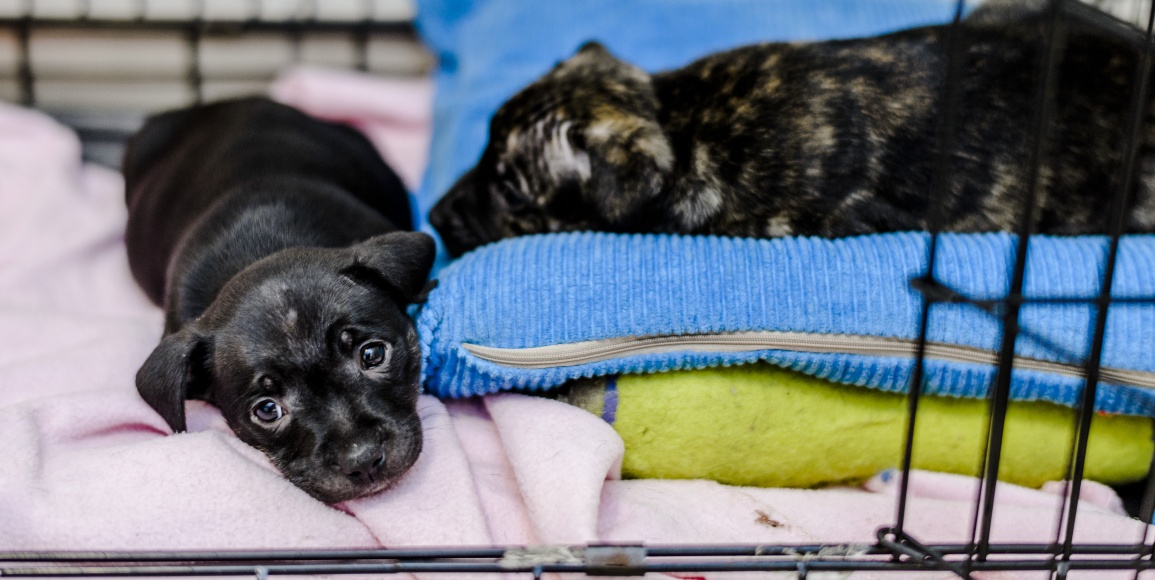
Unpicking the knots
Buying a pet in the UK is a postcode lottery and the welfare of thousands of pets being bred and sold is at risk, our new report has revealed.
Under-resourced local authorities are struggling to cope with enforcing welfare standards for pet shops and dog breeders and an ever-growing unlicensed online pet trade means many animals are slipping under the radar entirely, with unscrupulous breeders making thousands of pounds while putting pets and consumers at risk.
Our report unpicks the knots of this complicated system that leaves vulnerable pets at risk and makes recommendations to ensure pet welfare is prized above profit.
Commerical Breeding Investigation
Our report
Unpicking the Knots: the case for a more cohesive approach to pet welfare legislation highlights shocking findings in licensed pet shops and breeding establishments, including:
- puppies kept with no access to daylight
- no water bowls present
- puppies and their mothers kept in rabbit hutch-type cages
- damage to a bird's wing caused by self-mutilation due to stress
- exotic pets such as marmosets, fruit bats and parrots kept in inappropriate conditions and displaying worrying behaviour
- kittens not fed at correct times
- dog breeder vaccinating puppies using illegally imported vaccines from abroad
- maggots in water bowls
The report brings to light serious concerns about the ability of local authorities to enforce welfare laws with the resources and training available to them.
Local authorities have a statutory duty to collect stray dogs and reunite them with their owners - but legislation doesn't define how and when this should operate, meaning services are a postcode lottery.
Our investigation found:
- 49 per cent of the public thought would contact the RSPCA - a charity with no responsibility for strays - rather than their local authority if they found a stray dog*
- 90 per cent dog warden services only operate during standard weekday working hours, meaning weekend and evening services are a postcode lottery
- annual spend on dog warden services has decreased by £4,500 per local authority across Great Britain since 2013
Support from animal lovers
A number of notable animal lovers have signed our letter calling on government to act, featured in The Times
Sir,
Blue Cross pet charity’s new report Unpicking the knots: the cohesive approach to pet welfare legislation shows that overstretched local authorities lack the expertise and resources to pick up on horrific welfare issues in pet shops and breeding premises, while unscrupulous online sellers slip under the radar entirely.
Findings include pets shops not inspected for two years, maggots in drinking water, puppies with no access to daylight and many licensing officers unable to identify welfare issues with exotic pets. Blue Cross vets are frequently faced with puppies and kittens that fall desperately ill just days after they are sold.
We are calling on the Government for legislation that makes a real difference to pets bred and sold in the UK by empowering local authorities with sufficient resources and training, targeting the growing online pet market and making breeders and sellers fully accountable for the welfare of pets in their care - only then can Britain can truly start to live up to its reputation as a nation of pet lovers once more.
Full list of signatories:
Ben Fogle; George Michael; Graham Norton; British Veterinary Association President, Gudrun Ravetz; Helen George; Jo Brand; Joanna Lumley OBE; Dr Joe Inglis BVSc MRCVS; Dr Judy Puddifoot MRCVS BVet Med BSc MSc; Dr Julian Norton VetMB, MA, MRCVS, GPCert SAP; Kirsty Gallacher; Lesley Nicol; Dr Mark Evans BVetMed MRCVS; Martin Clunes OBE; Miranda Richardson; Morrissey; Pam Ferris; Dr Peter Wright BVSc, MRCVS; Rick Wakeman; Dr Steve Leonard BVSc MRCVS; Twiggy Lawson
Buyer beware
Real life stories of real life pets who have suffered thanks to ineffective legislation.
Scampi’s story
Scampi was an impulse purchase from a pet shop – an environment totally unsuitable for puppies.
When his owner entered the pet shop he found Scampi with five littermates in a small, dirty box and was not shown their parents. Scampi has spent his first ten to 12 weeks inside a shop environment and missing out on a crucial socialisation period that should have prepared him for later life.
When Scampi arrived at a Blue Cross rehoming centre, his behaviour was typical of a dog that has been severely under socialised at the young fear imprint stage - he was scared of everything and wouldn’t come near anyone.
Shadow’s tale
Shadow had been advertised on a classified website and was suffering from severe dehydration.
The seller gave Shadow’s new owner no advice about caring for a puppy and didn’t tell them he was sick.
His owners now want to warn others about the perils of buying pets online.
Aslan’s journey
When his owner went to see the puppies, Aslan was presented to them in a box along with his littermates. Aslan was chosen, but the breeder also offered the owner an older pup from another litter.
Poor Aslan was underweight, under-socialised, and in very poor condition. He is a very cute chap, but he is not as confident as his name would suggest.
Advice: How to buy a puppy
With buying a puppy being a true postcode lottery, and fraudsters seeking to take advantage of unsuspecting people wanting a family pet, we’ve put together some top advice to help you find a healthy puppy who will bring you a lifetime of happiness.





